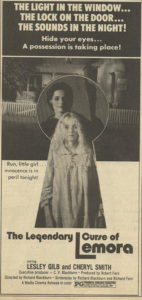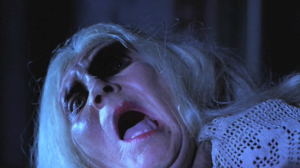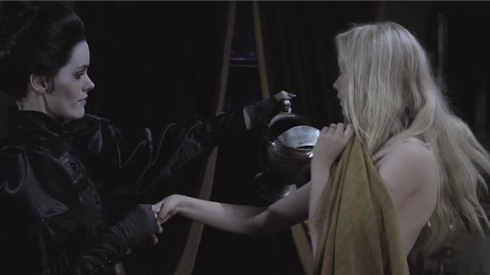 A dreamlike and often spellbinding early seventies low-budgeter that’s much beloved by horror cultists the world over. I don’t believe it’s a masterpiece but find it quite effective nonetheless, a skilled and stylish exercise in atmospheric dark fantasy.
A dreamlike and often spellbinding early seventies low-budgeter that’s much beloved by horror cultists the world over. I don’t believe it’s a masterpiece but find it quite effective nonetheless, a skilled and stylish exercise in atmospheric dark fantasy.
With LEMORA, director Richard Blackburn (best known for co-writing Paul Bartel’s EATING RAOUL) and producer Bob Kern were admittedly looking to cash in on the success of 1970’s COUNT YORGA, VAMPIRE, although their film, completed in 1973, is far more literate and artful than the exploitive COUNT YORGA and its equally tawdry offspring. Released on the drive-in circuit under the titles LADY DRACULA and THE LEGENDARY CURSE OF LEMORA, the film lapsed into obscurity for the next thirty years (excepting a poorly mastered VHS release in the early nineties courtesy of Moore Video) but has finally been commercially released on DVD, in gorgeously remastered fashion, by Synapse Films.
LEMORA has acquired a substantial cult following over the years, due largely to its scarcity. As a result I think it’s become quite overrated; for proof check out the DVD linear notes, which try to pass of the film’s technical crudeness as “the naïve constructs of the hungry mind of an impressionable child.” Furthermore, LEMORA’S fairy tale like rendering of childhood fears had already been done more effectively in NIGHT OF THE HUNTER (an evident influence), THE FOOL KILLER and VALERIE AND HER WEEK OF WONDERS (whose surreal tone is nearly identical to that of LEMORA).
In the late 1800’s, a bank robber flees police and ends up in the clutches of a mysterious cult, who send a note to the robber’s young daughter Lila stating that her father’s near death. Lila decides to leave her post as alter girl at her local church to track down her father, managing to hitch a ride on an otherwise abandoned bus driven by a scary, growling freak. Not that she has long to contemplate the driver’s nature, however, as the bus is driven off the road by a band of hairy monstrosities.
Lila next finds herself in a mysterious orphanage owned by the folks holding her father, where she’s locked in a tiny cell (how she survived the previous scene is left unexplained). She escapes into the main part of the building, an opulently decorated arena presided over by the elegant and stately Lemora, who has some unhealthy designs on our young heroine. Again, however, the hairy creatures show up, driving Lila into the woods where she spies Lemora biting a child’s neck through an open window, revealing her true nature: a vampire! That’s in direct contrast to the hairy critters in the woods, who are in fact werewolves…and whose ranks include Lila’s father. A confrontation between the two factions is eminent, and provides Lila with an opportunity to evade Lemora, but only for so long; inevitably Lemora manages to finally capture her prey for a none-too-happy ending…
Two things are immediately apparent about LEMORA: the lead performance by the late Cheryl “Rainbeaux” Smith (who’s in nearly every scene) is extremely effective, and the film looks GREAT from start to finish. The cinematography by Robert Caramico is bathed in gorgeous shades of red and blue, creating a nighttime dreamscape worthy of Fellini. Caramico and director Richard Blackburn are at their best in creating an atmosphere of elemental, storybook horror that registers far more vividly than the rather underdeveloped narrative.
Blackburn also deserves credit for the film’s authentic feeling nineteenth century Southern milieu, quite an impressive achievement considering that the film was shot in Modesto, California! I’m not sure, however, that this gets him off the hook for his erratic pacing and oft clumsy staging (particularly in the jumbled climax). The film is well worth seeing, but keep your expectations in check.
Vital Statistics
LEMORA: A CHILD’S TALE OF THE SUPERNATURAL
Blackfern Productions
Director: Richard Blackburn
Producer: Robert Fern
Screenplay: Richard Blackburn, Robert Fern
Cinematography: Robert Caramico
Editing: Pieter S. Hubbard
Cast: Lesley Gilb, Cheryl Smith, Richard Blackburn, William Whitton, Hy Pike, Maxine Ballantyne, Steve Johnson, Parker West, Charla Hall, Jack Fisher, Buck Buchanan


